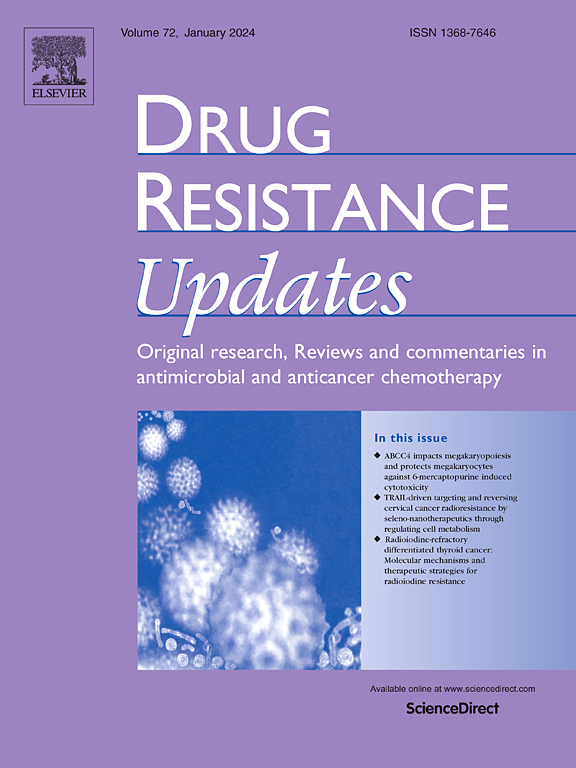Comprehensive metabolomic analysis identifies key biomarkers and modulators of immunotherapy response in NSCLC patients
IF 15.8
1区 医学
Q1 PHARMACOLOGY & PHARMACY
引用次数: 0
Abstract
Although immune checkpoint inhibitors (ICIs) have revolutionized immuno-oncology with effective clinical responses, only 30 to 40% of patients respond to ICIs, highlighting the need for reliable biomarkers to predict and enhance therapeutic outcomes. This study investigated how amino acid, glycolysis, and bile acid metabolism affect ICI efficacy in non-small cell lung cancer (NSCLC) patients. Through targeted metabolomic profiling and machine learning analysis, we identified amino acid metabolism as a key factor, with histidine (His) linked to favorable outcomes and homocysteine (HCys), phenylalanine (Phe), and sarcosine (Sar) linked to poor outcomes. Importantly, the His/HCys+Phe+Sar ratio emerges as a robust biomarker. Furthermore, we emphasize the role of glycolysis-related metabolites, particularly lactate. Elevated lactate levels post-immunotherapy treatment correlate with poorer outcomes, underscoring lactate as a potential indicator of treatment efficacy. Moreover, specific bile acids, glycochenodeoxycholic acid (GCDCA) and taurolithocholic acid (TLCA), are associated with better survival and therapeutic response. Particularly, TLCA enhances T cell activation and anti-tumor immunity, suggesting its utility as a predictive biomarker and therapeutic agent. We also suggest a connection between gut microbiota and TLCA levels, with the Eubacterium genus modulating this relationship. Therefore, modulating specific metabolic pathways—particularly amino acid, glycolysis, and bile acid metabolism—could predict and enhance the efficacy of ICI therapy in NSCLC patients, with potential implications for personalized treatment strategies in immuno-oncology.
One sentence summary
Our study identifies metabolic biomarkers and pathways that could predict and enhance the outcomes of immune checkpoint inhibitor therapy in NSCLC patients
全面的代谢组学分析确定了 NSCLC 患者免疫疗法反应的关键生物标记物和调节因子
尽管免疫检查点抑制剂(ICIs)以有效的临床反应彻底改变了免疫肿瘤学,但只有30%到40%的患者对ICIs有反应,这突出表明需要可靠的生物标志物来预测和提高治疗效果。本研究调查了氨基酸、糖酵解和胆汁酸代谢如何影响非小细胞肺癌(NSCLC)患者的 ICI 疗效。通过靶向代谢组学分析和机器学习分析,我们发现氨基酸代谢是一个关键因素,组氨酸(His)与良好疗效相关,而高半胱氨酸(HCys)、苯丙氨酸(Phe)和肌氨酸(Sar)与不良疗效相关。重要的是,His/HCys+Phe+Sar 的比值是一个可靠的生物标志物。此外,我们还强调了糖酵解相关代谢物的作用,尤其是乳酸盐。免疫治疗后乳酸水平升高与较差的预后相关,这突出表明乳酸是治疗效果的潜在指标。此外,特定的胆汁酸--甘氨胆酸(GCDCA)和牛磺酸胆酸(TLCA)--与更好的存活率和治疗反应相关。特别是,TLCA 可增强 T 细胞活化和抗肿瘤免疫力,这表明它可作为一种预测性生物标记物和治疗剂。我们还发现肠道微生物群与 TLCA 水平之间存在联系,而 Eubacterium 属会调节这种关系。因此,调节特定的代谢途径--尤其是氨基酸、糖酵解和胆汁酸代谢--可以预测并提高 NSCLC 患者接受 ICI 治疗的疗效,这对免疫肿瘤学中的个性化治疗策略具有潜在的意义。
本文章由计算机程序翻译,如有差异,请以英文原文为准。
求助全文
约1分钟内获得全文
求助全文
来源期刊

Drug Resistance Updates
医学-药学
CiteScore
26.20
自引率
11.90%
发文量
32
审稿时长
29 days
期刊介绍:
Drug Resistance Updates serves as a platform for publishing original research, commentary, and expert reviews on significant advancements in drug resistance related to infectious diseases and cancer. It encompasses diverse disciplines such as molecular biology, biochemistry, cell biology, pharmacology, microbiology, preclinical therapeutics, oncology, and clinical medicine. The journal addresses both basic research and clinical aspects of drug resistance, providing insights into novel drugs and strategies to overcome resistance. Original research articles are welcomed, and review articles are authored by leaders in the field by invitation.
Articles are written by leaders in the field, in response to an invitation from the Editors, and are peer-reviewed prior to publication. Articles are clear, readable, and up-to-date, suitable for a multidisciplinary readership and include schematic diagrams and other illustrations conveying the major points of the article. The goal is to highlight recent areas of growth and put them in perspective.
*Expert reviews in clinical and basic drug resistance research in oncology and infectious disease
*Describes emerging technologies and therapies, particularly those that overcome drug resistance
*Emphasises common themes in microbial and cancer research
 求助内容:
求助内容: 应助结果提醒方式:
应助结果提醒方式:


